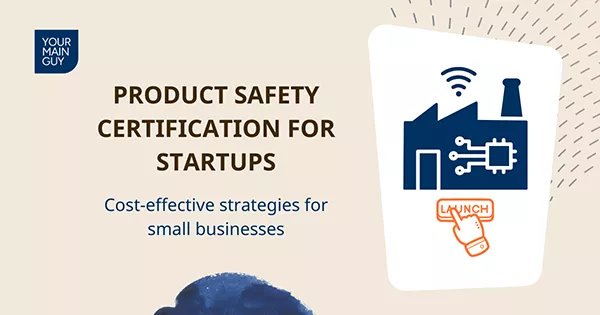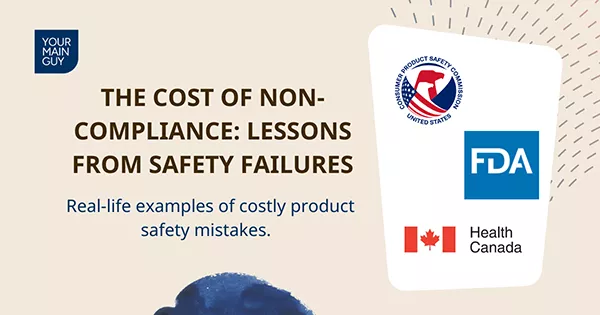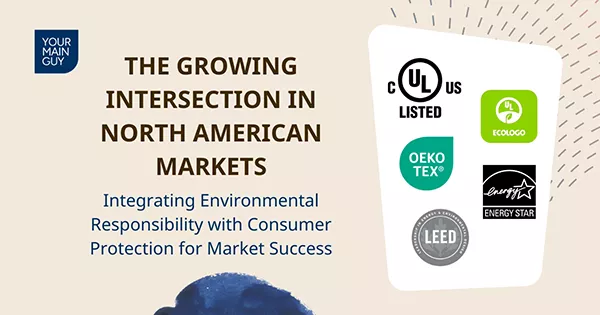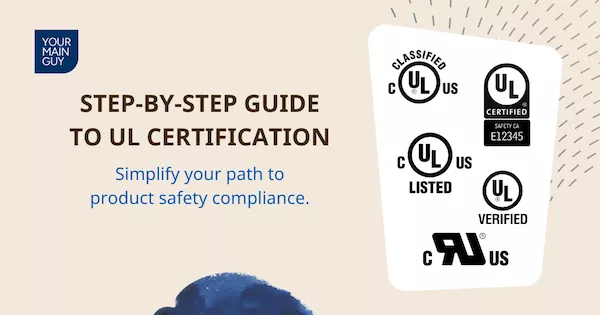Product Safety for Small Businesses: A Startup's Guide to Certification in North America
Essential guide to product safety certifications for startups in North America. Learn which certifications are mandatory, cost-effective testing strategies, and how to navigate CPSC, FCC, and FDA requirements on a budget.
As a startup founder or small business owner in North America, navigating the complex landscape of product safety certifications can feel overwhelming. With limited resources and budget constraints, understanding which certifications are essential and which can wait could mean the difference between a successful launch and costly delays. This guide will walk you through the certification process, helping you make informed decisions that protect both your business and your customers.
Why Should Your Startup Care About Product Certification?
In today's market, product certification is more than just a regulatory checkbox—it's a fundamental aspect of building a sustainable and reputable business. While the initial costs and time investment might seem daunting, the alternatives can be far more expensive and potentially devastating for a startup.
The financial impact of non-compliance can be severe, with fines ranging from thousands to millions of dollars. More importantly, failing to meet safety standards can result in product recalls, legal liability, and irreparable damage to your brand's reputation. A single safety incident can destroy years of hard work in building customer trust.
The North American regulatory landscape is particularly complex, with different requirements at federal, state, and local levels. In the United States, the Consumer Product Safety Commission (CPSC) oversees product safety regulations, while Health Canada governs product safety in Canada. Both countries have mutual recognition agreements for many certifications, but understanding the nuances is crucial for compliance.
What Are the Absolutely Essential Certifications for Your Product?
The mandatory certifications for your product depend primarily on your industry and product type. However, some fundamental requirements apply across most categories:
Federal Mandatory Certifications:
- CPSC Compliance: All consumer products must meet CPSC safety standards. This includes:
- Meeting applicable mandatory standards
- Issuing certificates of compliance
- Reporting potential product hazards
- Maintaining testing and production records
- FDA Approval: Required for:
- Food products and additives
- Medical devices
- Cosmetics
- Electronic products that emit radiation
- UL/CSA/ETL Safety Certification: Required for most electrical products. These certifications ensure:
- Electrical safety standards compliance
- Fire hazard prevention
- Mechanical safety requirements
Industry-Specific Requirements:
Different industries have additional mandatory certifications:
- Children's Products: Must comply with CPSIA (Consumer Product Safety Improvement Act) requirements, including:
- Third-party testing
- Tracking labels
- Lead content restrictions
- Small parts regulations
- Electronics: Require:
- FCC certification for electromagnetic compatibility
- Energy efficiency standards compliance
- Battery safety certifications
- Building Materials: Need:
- ASTM standards compliance
- Fire resistance ratings
- Environmental safety certifications
State-Level Regulations:
Some states have additional requirements:
- California's Proposition 65 warnings
- State-specific fire safety standards
- Local environmental regulations
How Can You Navigate the FCC Certification Process?
For electronic products, FCC certification is often mandatory. Understanding the process can help you navigate it cost-effectively:
Types of FCC Certification
- Verification: Simplest form, suitable for:
- Basic electronic devices
- Products with minimal RF emissions
- Cost: $500-1,500
- Declaration of Conformity (DoC):
- More complex devices
- Requires accredited laboratory testing
- Cost: $1,500-3,000
- Full Certification:
- Required for intentional radiators (wireless devices)
- Most extensive testing requirements
- Cost: $3,000-10,000+
Some Cost-Saving Strategies
- Consider pre-compliance testing
- Use modular certifications when possible
- Bundle similar products for testing
- Choose laboratories offering startup discounts
Which "Nice-to-Have" Certifications Could Boost Your Market Position?
While not mandatory, certain certifications can significantly enhance your product's market appeal. These "nice-to-have" certifications can differentiate a product in the market and attract a broader customer base, even if they are not legally required.
Environmental Certifications
- Energy Star:
- Demonstrates energy efficiency
- Preferred by government and institutional buyers
- Cost: $2,500-5,000
- EPEAT:
- Electronics environmental assessment
- Growing importance in B2B sales
- Cost: $3,000-7,000
Quality Management Certifications
- ISO 9001:
- Demonstrates quality management systems
- Important for B2B relationships
- Cost: $5,000-15,000
- Industry-Specific Quality Marks:
- Enhanced credibility
- Market differentiation
- Cost varies by industry
What Are Your Testing Options and Their Costs?
Understanding testing options can help optimize your certification budget by allowing startups to choose between in-house capabilities and third-party facilities. This strategic selection enables businesses to control costs while ensuring their products meet necessary safety and quality standards.
In-House Testing Capabilities:
Develop basic testing capabilities for:
- Initial product development
- Quality control
- Pre-compliance testing
- Continuous monitoring
Initial investment: $5,000-20,000
Annual maintenance: $2,000-5,000
Third-Party Testing:
You can choose between those two options:
- Full-Service Laboratories:
- Comprehensive testing
- Multiple certifications
- Higher costs but faster results
- Specialized Testing Facilities:
- Focus on specific requirements
- Often more cost-effective
- May require multiple facilities
Cost Optimization Strategies:
- Bundle multiple tests
- Negotiate volume discounts
- Use pre-compliance testing
- Share testing costs with partners
How Can You Build a Cost-Effective Certification Strategy?
Developing a strategic approach to certification can save significant resources by streamlining processes and avoiding costly errors. This involves carefully planning which certifications are essential and implementing efficient testing and compliance strategies.
Prioritization Framework:
- Must-Have Certifications:
- Legal requirements
- Market access necessities
- Safety fundamentals
- High-Impact Optional Certifications:
- Strong ROI potential
- Market differentiation
- Customer requirements
- Nice-to-Have Certifications:
- Future market expansion
- Brand enhancement
- Competitive advantages
Financial Planning:
- Budget 5-10% of development costs for certification
- Include ongoing compliance costs
- Plan for renewal fees
- Consider insurance requirements
Government Support:
Many jurisdictions offer support for small businesses:
- Grant programs (Canada, USA)
- Tax incentives (Canada, USA)
- Technical assistance (Canada, USA)
- Testing servicesubsidies (Canada, USA)
What Common Certification Pitfalls Should You Avoid?
Learning from common mistakes can save time and money by helping startups avoid costly delays and financial penalties associated with non-compliance and product recalls.
Documentation Errors:
- Incomplete technical files
- Missing test reports
- Inadequate user instructions
- Poor record-keeping
Process Mistakes:
- Wrong certification sequence
- Inappropriate test methods
- Insufficient sample sizes
- Late compliance consideration
Strategic Errors:
- Over-certification
- Under-budgeting
- Wrong certification partners
- Ignoring market requirements
How Can You Maintain Certifications While Scaling?
Maintaining certifications as your business grows requires systematic approaches that involve establishing a robust quality management system and a comprehensive testing program. These approaches ensure ongoing compliance through document control, change management, regular audits, production testing, and market surveillance. This proactive strategy helps businesses adapt to evolving regulations and maintain product safety as they scale.
Ongoing Compliance:
- Quality Management System:
- Document control
- Change management
- Supplier oversight
- Regular audits
- Testing Program:
- Production testing
- Periodic verification
- Change validation
- Market surveillance
Cost-Effective Maintenance:
- Automate compliance processes
- Train internal auditors
- Implement preventive measures
- Build strong supplier relationships
Future Planning:
- Market Expansion:
- Research new market requirements
- Plan certification updates
- Budget for new certifications
- Product Development:
- Consider certification in design
- Plan for modifications
- Maintain compliance records
Product safety certification is a crucial investment for startups in North America. While the process can be complex and costly, a strategic approach focused on essential certifications and cost-effective compliance can help manage the burden while ensuring market access and customer safety.
Some advice you should remember to
- Prioritize mandatory certifications
- Invest in high-impact voluntary certifications
- Develop efficient testing strategies
- Plan for long-term compliance
- Seek professional guidance when needed
By following these guidelines and maintaining a balanced approach to certification, your startup can build a strong foundation for sustainable growth while ensuring product safety and regulatory compliance.




